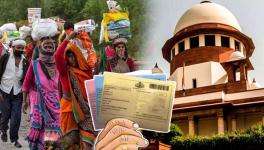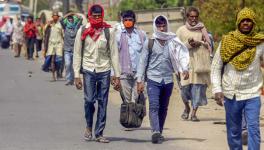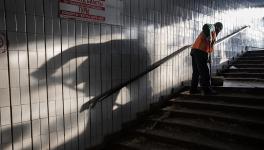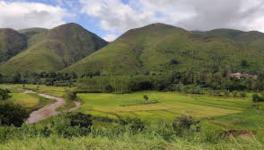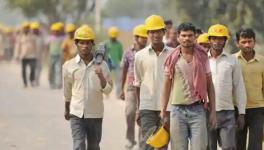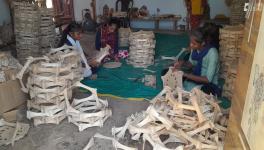In Odisha, Children of Returnee Migrants See Bleak Future with School Closure Notice
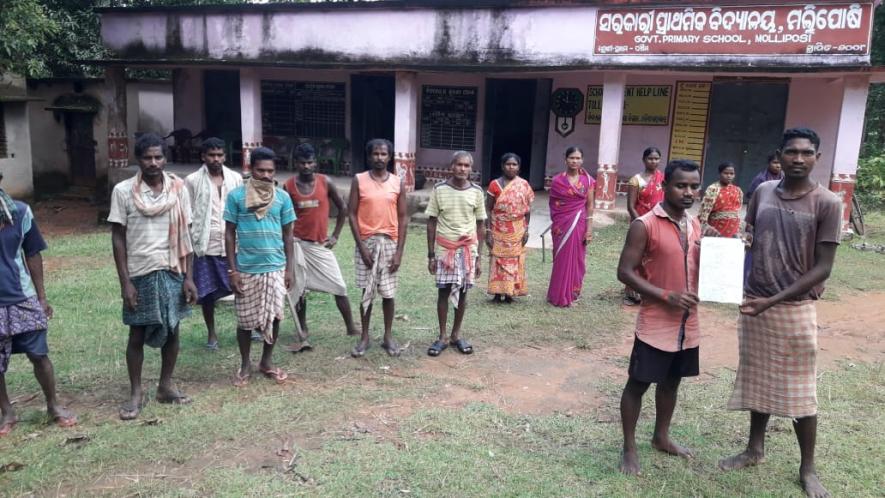
Parents and SMC members opposing closure of Molliposi primary school, they have handed over an application to the BEO regarding this
When the nationwide lockdown was imposed, Bhagban Hansda (42) and his wife Randai Hansda (36) who had migrated to other states to work as construction workers, returned home with a hope to stay back and lead a life in their village Molliposi. But the state government’s recent decision to close all state-run schools with less than 20 students is forcing him and other migrants to rethink about their decision.
“We had faced numerous difficulties during that time. We felt if we wouldn’t return to our village we would die in starvation and our bodies will be left unattended,” said Bhagban, of Molliposi village under Kaptipada block in Odisha’s Mayurbhanj district. However, he questioned, “How can you stay in the village where there is no future of your children to enroll in school?”
Maisa Tudu, 28, a young parent and a returnee migrant expressed similar sentiments. He has two children and had returned to his village during the lockdown. “We are still worried about where to enroll our children. The merger school is far from our living area. If there are no opportunities for our children, we may again have to think about migration,” he said.
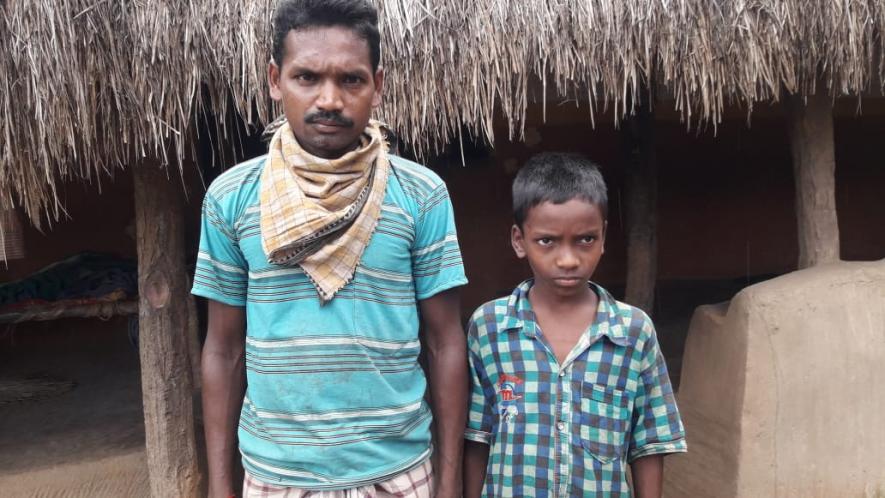
Returnee migrant worker Bhagban Hansda with his son Muchiram, he is worried about his son’s admission in the village school
In 2019, the Molliposi Primary School of Kalamgadia Panchayat in Kaptipada block had 18 students. The same year after four students of class 5 passed from the primary school, the student strength declined to 14. In 2020, when the state government decided to close all state-run schools with less than 20 students, Molliposi became one of the schools to receive the notice. However, the issue is that in the mean time, 12 students of returnee migrants have already taken admission in the said school. The parents of these children are now in a dilemma over the future of their children.
Closure of state-run schools
Nearly 12,000 state-run primary schools with less than 20 students’ strength are going to suffer a similar fate as the Molliposi primary school due to the state government’s decision. School and Mass Education minister, Sameer Ranjan Dash, in an interview had said that the decision has been put on hold due to the COVID-19 situation but there has been no official notification so far.
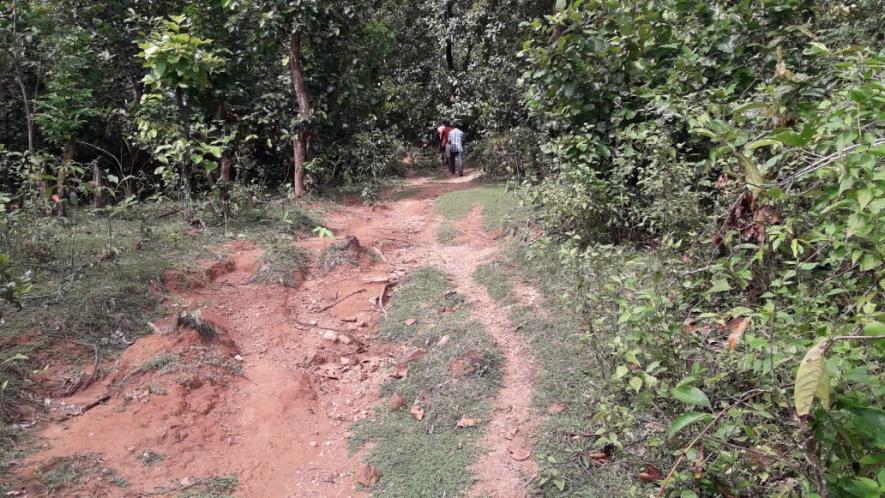
If the present school gets closed children have to cross a part of hilly terrain to reach the merger school
Meanwhile, the school management committee (SMC) members and parents are clueless whether schools will be closed or not. A survey of 81 schools in nine districts-conducted by Sikshasandhan, a non-profit organisation working on education rights reveals that, due to the closure notification of state government, returnee migrants are facing difficulties in enrolling their children in village primary schools.
Also read: Merger of Schools Forces Students to Drop out, BJP Fears a Political Debacle
“Besides returnee migrants, due to the economic crisis and loss of jobs this year, many parents in rural areas have withdrawn their children from private schools to admit them in government schools. However, during our survey it was found that in 65 schools there have been no admissions as the schools have received closure notice. These children are either sitting idle at home, helping parents in agriculture fields or engaged in labour work,” said Anil Pradhan, secretary of Sikshasandhan and convener of Right to Education Forum, Odisha.
Fear of dropping out
The current location of Molliposi Primary School is 3 km away from the nearest settlement. However, if the government closes this school, the children will have to cross agricultural fields, a nullah and part of hill terrain to attend the merger school. “As per the notice if this school is closed and children will be asked to shift to the merger school, it will be difficult for them to attend. The merger school is 4-5 km away from their settlement and parents may not agree to send their wards. There is every chance that children will drop out, especially girl children,” said Dakhin Tudu, the SMC member of Molliposi Primary School.
Like Molliposi village, in Ranipokhari Panchayat too, the returnee migrants are seeing a bleak future of their children. In the Patrasahi Primary school of Ranipokhari Panchayat, there were 36 students in 2019. But the CRCC (Cluster Resource Centre Coordinator) submitted a report saying that the enrollment status of this school is only 16. As a result, this school too received a closure notice.
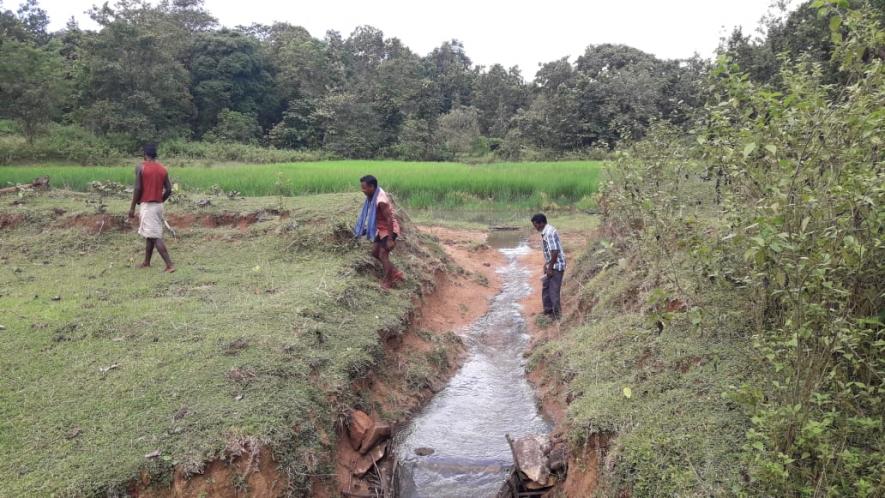
Children have to cross this water stream on their way to merger school. The stream overflows during monsoon
The villagers, SMC members and the Head Master had approached the Block Education Officer (BEO) to point out the mistake. Even though the BEO has assured to discuss the issue with the officials in Odisha School Education Programme Authority (OSEPA), but no official letter has been received yet, said the villagers.
“We are under stress whether this school will continue or will be closed. If this school will be closed it will be difficult for us to send them to merger school as it is far away from our settlement and separated by a hilly terrain,” said Kuele Tudu, parent and SMC member of Patrasahi Primary School, adding, “We fear children will be dropped out from the school.”
Meanwhile, the SMC members and parents of these schools have requested the state government in an application to withdraw the decision and re-open the school. “If the government doesn’t re-think about school closure decision, it will lead to massive drop outs,” Pradhan from Sikshasandhan said.
Digital divide
When the state government decided to start online education for the students of state-run schools, the children of tribal areas were completely untouched. Lack of internet connectivity, absence of android phone and dearth of digital knowledge of their parents keep these children away from online education, as pointed out by Sikshasandhan.
“There are other issues too. In primary classes, the tribal children are taught in tribal languages-Santali, Ho, Kui and Kolha etc, which is not possible in gadgets. So, they are completely out of their studies,” said Sudarshan Muduli, Project Coordinator, Sikshasandhan. He added that the language teachers who are appointed by the government to teach tribal language in these schools also do not have smart phones to continue online education for tribal children.
Also read: India’s Digital Divide: Who Faces it and How Wide is it?
As the schools are closed to control the spread of COVID-19, in remote villages these tribal children are spending time in rearing cows and goats, helping parents in agriculture fields, in hills (bagad) and girls are engaged in household chores or sibling care, the report by Sikshasandhan states.
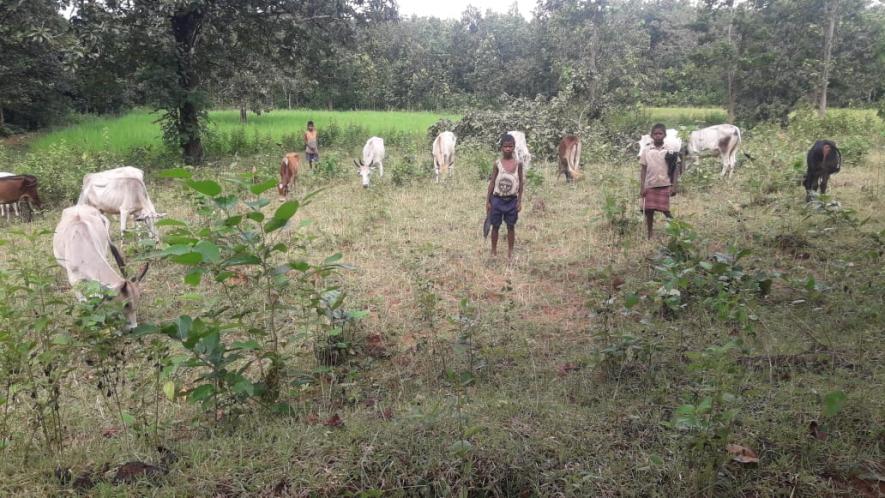
Children rearing cows in nearby fields as schools are closed for a prolonged period to contain the spread of coronavirus
Recently, the state government took the decision to teach students through television and radio. However, Muduli said, “The Noto panchayat of Kaptipada block has no electricity facility. There are 739 households and out of that only two households possess television sets, and the upper class people who have television sets at home do not allow these marginalised to enter their house. The returnee youth migrants have smart phones but they only use it to watch downloaded videos. In this situation, how we are talking about teaching these marginalised through electronic gadgets.”
Muchiram, 11, son of Bhagban Hansda who returned to the village with his parents, is equally clueless about his future. At present, most of his time is spent on rearing cows in nearby fields. He has not touched his books for the last six months. He said, “If the village school does not re-open, I will be asked to attend the merger school, which is 4-5 km far from our village. Then I will prefer to drop out as I am scared to cross this hilly terrain, which is still new to me.”
(The author is an independent journalist. Views are personal.)
Get the latest reports & analysis with people's perspective on Protests, movements & deep analytical videos, discussions of the current affairs in your Telegram app. Subscribe to NewsClick's Telegram channel & get Real-Time updates on stories, as they get published on our website.










